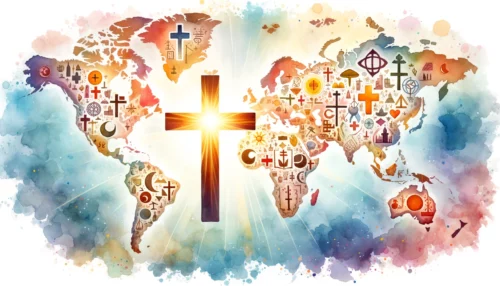Christianity, since its inception, has been a faith characterized by profound diversity and adaptability. This diversity is evident in the multitude of denominations that exist within the Christian faith today. Each denomination, from Roman Catholicism to Protestantism and beyond, represents a unique interpretation of Christian theology and practice. These differences often arise from historical, cultural, and theological disputes, reflecting the dynamic nature of Christianity. This proliferation of denominations prompts a critical question: why does Christianity encompass such a wide range of beliefs and practices?
Historical and Theological Roots
The emergence of various Christian denominations can be traced back to the early centuries of Christianity. Initially, the Christian faith was relatively unified, though geographical differences in practice and interpretation began to emerge early on. The first major division occurred with the East-West Schism of 1054, separating what are now the Eastern Orthodox and Roman Catholic Churches. This schism was rooted in differences over theological doctrines, such as the nature of the Holy Trinity, and ecclesiastical disputes, like the authority of the Pope.
The Protestant Reformation in the 16th century further splintered Christianity. Key figures like Martin Luther, John Calvin, and Henry VIII challenged the doctrines, rituals, and authority of the Roman Catholic Church, leading to the formation of various Protestant denominations. Luther’s emphasis on salvation by faith alone (sola fide) and the authority of Scripture (sola scriptura) became foundational for many Protestant denominations (Romans 1:17; 2 Timothy 3:16). Calvin’s teachings on predestination and the sovereignty of God influenced Reformed theology (Ephesians 1:4-5). The Anglican Church emerged in England, blending Protestant and Catholic traditions, as a result of political and religious conflicts under Henry VIII’s reign.
Theological disagreements often centered on interpretations of key Christian doctrines. The nature of the Eucharist, the role of grace and works in salvation, baptism practices, and church governance were common points of contention. These differences were not merely academic; they were deeply rooted in how individuals and communities understood their relationship with God and the practice of their faith.
The rise of denominationalism in Christianity also coincided with the global spread of the faith. Missionary movements, particularly in the 18th and 19th centuries, brought Christianity to diverse cultural contexts, leading to further denominational growth and development. In these new environments, Christianity often adapted to local customs and traditions, which in turn influenced theological interpretations and worship practices.
This period also saw the rise of various revival movements, contributing to the formation of new denominations. The Great Awakenings in America, for instance, led to the development of Methodism under the leadership of John Wesley, emphasizing personal holiness and a methodical approach to faith (Philippians 2:12-13). Pentecostalism emerged in the early 20th century, emphasizing the work of the Holy Spirit, speaking in tongues, and a direct, personal experience of God’s presence (Acts 2:1-4).
The historical and theological roots of Christian denominations are deeply embedded in the faith’s early development and subsequent global spread. Key events like the East-West Schism and the Protestant Reformation, along with significant figures and movements, played pivotal roles in shaping the diverse landscape of Christianity. These developments were influenced by theological interpretations, cultural adaptations, and the desire to live out Christian faith in accordance with understood biblical principles.
Cultural and Societal Influences
The diversity of Christian denominations is not only a result of theological differences but is also significantly influenced by cultural and societal factors. Culture shapes how people interpret texts, including the Bible, and this in turn affects how they practice their faith. The interaction between Christianity and various cultures has led to a rich tapestry of expressions and practices within the faith.
In the early years of Christianity, the faith spread across different Roman and Hellenistic cultures, absorbing and integrating elements of these cultures. This integration was evident in the adoption of Greek philosophy and language, which played a crucial role in formulating Christian doctrine and theology. The cultural context of the Middle East, North Africa, and Europe provided diverse settings in which Christian thought and practice developed, leading to different theological emphases and traditions.
The impact of national and ethnic identities on Christian denominations cannot be overstated. For example, the Orthodox Church is deeply intertwined with the cultural and national identities of Eastern European countries. Similarly, the Anglican Church has been a significant part of English identity and history. These churches are not just religious institutions; they are also repositories of national culture and heritage.
With the expansion of European colonialism, Christianity was introduced to Africa, Asia, and the Americas, where it mingled with local traditions and customs. This interaction led to the development of indigenous forms of Christianity, reflecting local cultures and social structures. African Independent Churches, for instance, incorporate African cultural and religious elements into their Christian practice.
Socio-political contexts have also played a crucial role in shaping Christian denominations. The Lutheran Church’s development in Germany, for instance, was closely linked to the political and social climate of the time. In the United States, the social and political issues of slavery, civil rights, and immigration have profoundly influenced the development and stance of various Christian denominations.
Denominational differences have also been shaped by responses to modernity and secularism. Some denominations, like the Evangelical and Pentecostal movements, have grown in response to the challenges of secularization, emphasizing a personal relationship with God and the authority of the Bible in a rapidly changing world. Others, like mainline Protestant denominations, have tended to adapt their practices and teachings to align with contemporary societal values.
The cultural and societal influences on the development of Christian denominations are profound and varied. From the early integration of Greek philosophy to the interplay with national identities and the adaptation to local cultures during missionary movements, these factors have significantly shaped the way Christianity is practiced and understood. The interaction of faith with social and political issues has further contributed to the formation of distinct Christian traditions, reflecting the dynamic nature of the faith in different cultural and societal contexts.
The Impact on Christian Unity and Witness
The proliferation of Christian denominations has significant implications for both the unity of the Christian faith and its witness to the world. While denominational diversity reflects the adaptability and contextualization of Christianity, it also presents challenges in maintaining a cohesive Christian witness.
One of the central concerns is the perception of division within the body of Christ. Jesus prayed for the unity of his followers, expressing the desire that they be one as He and the Father are one (John 17:21-23). The existence of numerous denominations can give the impression of disunity and internal conflict, potentially undermining the message of the Gospel. This perception can be a stumbling block for those outside the faith and a source of confusion for believers.
Despite these challenges, denominational diversity also offers a range of expressions and approaches to Christian faith and practice. Different denominations emphasize various aspects of Christian doctrine and life, such as social justice, personal piety, liturgical worship, or evangelism. This diversity allows individuals to find a Christian community that resonates with their understanding and experience of faith.
Efforts towards ecumenism have been significant in addressing the challenges posed by denominationalism. Ecumenical movements seek to foster dialogue, understanding, and cooperation among different Christian traditions. The World Council of Churches, for instance, brings together churches from various denominational backgrounds to promote Christian unity and joint action in addressing global issues.
The witness of the Christian faith in the world is enriched by the diverse ways in which denominations engage with society and culture. Some denominations are particularly active in social justice initiatives, reflecting the biblical call to care for the poor and oppressed (Micah 6:8; Matthew 25:35-40). Others focus on evangelism and missionary work, emphasizing the Great Commission to make disciples of all nations (Matthew 28:19-20).
Denominational diversity also reflects the adaptability of Christianity to different cultural contexts. The ability of the faith to find expression within a variety of cultural settings has been key to its growth and vitality. This adaptability is a strength, allowing the faith to be relevant and meaningful in diverse societal contexts.
The diversity of Christian denominations, while presenting challenges to unity and witness, also contributes to the richness and adaptability of the faith. Denominational differences offer a variety of approaches to understanding and living the Christian life, accommodating diverse cultural contexts and individual spiritual needs. Efforts towards ecumenism and the engagement of denominations in society and culture enrich the Christian witness, demonstrating the faith’s relevance and dynamism in a changing world.
Unity in Diversity
The myriad of Christian denominations reflects the historical, cultural, and theological richness of the Christian faith. While presenting challenges to unity, this diversity also reveals Christianity’s remarkable ability to adapt and thrive in various contexts. The existence of different denominations should be viewed not as a division but as a mosaic of belief and practice, each contributing to the fuller understanding of the Gospel. This diversity, underpinned by a shared belief in Christ, illustrates the dynamic and living nature of the Christian faith, continually evolving and engaging with the world in meaningful ways.
Reflective Questions:
- How does my own denomination’s history and beliefs enrich my understanding of the Christian faith?
- In what ways can I learn from other Christian traditions to deepen my spiritual journey?
- How can the diversity within Christianity inspire more effective and compassionate engagement with the world around us?
The Christian faith, like a grand tapestry, is woven from diverse threads, each adding color and texture to the whole. Let this diversity inspire us to a deeper appreciation of our shared faith in Christ, encouraging us to engage with the world with wisdom, compassion, and a renewed sense of purpose. In this diversity, we find strength and beauty, a testament to the enduring relevance and vibrancy of our Christian heritage.














